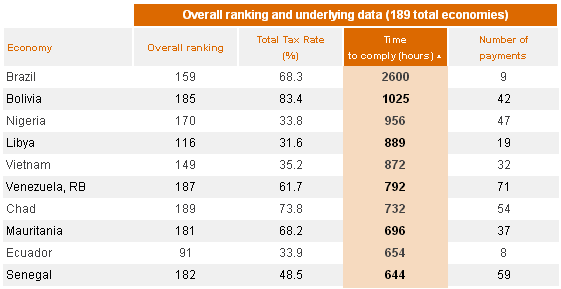8 facts about the Brazilian IT and Internet market from the local
Before entering Brazil with our product, we only knew that this country is the birthplace of the Lua language, to which we make our " fashionable " logs.

The distribution of themes on the Portuguese-speaking, mostly Brazilian, version of Stack Overflow (initially, instead of pt. In the urle, it was even br.)
And then Carlos appeared in our team - a former chemist who found great Russian love on the network, moved to Moscow and went from being an enikeyschik to a localization manager for a website designer. Having come to us, he destroyed a couple of myths about Brazil and told a lot of interesting things about how his friends live in Brazilian IT companies - after all, he had studied at one of the main technical universities of his country.
')
One of the popular comic books is called “The Programmer's Life”, and in style it is similar to how Dilbert was a developer.

Some comics are fictional. And part of it is based on the situations the author himself got into (since 2002 he wrote on Pascal and C, then switched to PHP and Python), his colleagues or readers of the site.
Here is one of the real stories:

For five years, “The life of a programmer” has grown into a popular site in local IT circles (here, for example, they advertise vacancies and new products) and a large one — over 180 thousand subscribers — is a Facebook community.
Now they even produce their coffee and t-shirts:

At the same time, the project itself started as a response to the appearance of the Brazilian web comic “Life of technical support”.
“About 15 years ago, the boom of internetization began in Brazil. Then we had our own search engine - like your Yandex or Rambler. Called Cade - from the word "where". They started in the mid-nineties and by the beginning of the 2000s were very, very popular, but ... They almost stopped developing the engine and just invested in advertising.
At the same time, Google and Yahoo made their localizations - and the results were objectively better. The need for a local search engine disappeared - Cade was bought by Yahoo and turned into a shop window for finding them. ”
According to Nielsen, the deal allowed Yahoo to reach up to 52% of Brazilian Internet users. And as Carlos notes, people often don’t have a difference - local product or foreign.
What happened to Google+? Right, Orkut. In the mid-2000s, this social network was popular in two places - Brazil and India. True, the demand in the individual countries did not affect the closure of the Google project.

Today, the main social network for Brazilians is Facebook (according to Social Bakers, the screen for 2012)
“Sometimes I envy the Russians: you have your own social networks created by local specialists for a local audience. In Brazil, in fact, apart from chat rooms, when the Internet was still for geeks, there was nothing social. ”
By the mid-2000s, local companies surrendered some of the tasty consumer segments to foreign players. Internet auction niches, for example, seized the Mercado Libre - an Argentine project, which in 1999 quickly made Portuguese localization and then swallowed up its main competitors - also foreign ones, by the way.
It is curious that at that time, competition from foreign Internet companies was better provided by people from offline:

For example, Netshoes, an online sportswear platform that now operates in three markets (Brazil, Argentina, Mexico), has grown from a sports equipment store opened in Sao Paulo in the early 2000s. This is their distribution center.
Traditionally, since the 90s, there have been areas where local companies have dominated - these are solutions for banks, industry, agriculture, and the public sector. Our Carlos explains the situation with security concerns and, sometimes, the word “corruption”. But there is another explanation - protectionism.
The demand for IT in industry is explained by local iron: the country has developed electronics production, for example, for airplanes and oil rigs. And there is a strict requirement, what percentage of the total production should be located within the country: depending on the industry, it can reach up to 80%.
Government agencies have long been trying to support local software developers through public procurement. Since 2014, there has even been a law under which preferences for tenders are given specifically to local developers. For example, they can offer a price higher than that of a competitor and win. So, although in Brazil, all IT companies register local legal entities - this is due to the acceptance of payments - sometimes it can be more local.
NB: At the same time, even local companies have to pay additional deductions to the treasury, if they buy foreign software or use data centers outside Brazil. C taxes here are generally interesting.
By the beginning of the 2010s, about 9 thousand companies were operating in the Brazilian software, IT services and telecom market. Among them, there were 43.9% of micro-enterprises — often companies of one or a couple. Moreover, not only startups, which at that time began to support the state.
“At one time, micro-companies were often turned on by those who in fact did not work for themselves, but for another small IT company. This was done so that the employer concluded contracts not with the person, but with his company - in this way the employer shifted the tax burden from his head to yours. I heard that in the CIS countries it is also possible to come across such a practice, but we feel that it has become the scale of an industrial disaster. Therefore, to work in the state, and not, as it were, to freelance - this was already a career achievement. ”

According to a study by PwC and the World Bank, Brazil’s most “time consuming” tax regime
Of course, this was not practiced by the largest and most well-known companies. But the truth is that a few years ago, any IT company had to pay 37% of taxes from the employee’s salary.
Now the situation is changing: for example, tax deductions are reduced if the employer invests in the training of full-time employees - and the expenses for the development of people can be compensated for using the state IT support program.
And how much do they get? The Brazilians do not have their “My Circle”, but there is something like “HeadHunter”:

For convenience and compactness of the display, we translated by Google a block for sorting vacancies.
More often there are offers from 1 to 3 thousand reais - this is the initial level when you are hired, for example, after the institute. The head of technical support, a good information security specialist or an experienced developer can count on 8-10 thousand reais.
Translated into dollars, the salary range is $ 300-3000 (now they give about R $ 3.6 for a dollar). At the same time, as history shows, the rate of the real to the dollar can change significantly. Here is the dynamics from 1995 (the real in Brazil was introduced in 1994) to 2011:

The ruble exchange rate to the Brazilian real has also changed dramatically over time. Now it is about 19 rubles for real:

Accordingly, salaries in the local IT sector in terms of rubles vary from 20 to 200+ thousand.
Even their holidays are longer - 30 days.
“Officially, there are only five holiday weekends in our country. But, like you in Russia, there is more New Year holidays - they start before the Catholic Christmas and end after the New Year. Plus, of course, the carnival is such an analogue of your May holidays, when work stops and everyone goes on vacation. ”
Even in Brazil there is an interesting tradition about the holidays: if the day off falls, for example, on Tuesday, then Monday will make it non-working. It seems as long as everything looks familiar? But - no one will arrange a working Saturday on the transfer, as we have in Russia.

Here it is necessary to dispel the popular stereotype that "Brazilians are lazy." In many ways, the roots of the myth grow from the time of the abolition of slavery: many local people refused to work on the plantations, and immigrants from Europe occupied a niche. They usually called Brazilians "lazy."
And to be honest, the same Argentines in terms of the number of holiday weekends are much ahead of Brazil - they have 19 of them.
Now in the ICT sector of Brazil employs about a million people. And according to estimates of industry associations and officials, 900 thousand specialists are needed.

And when there are not enough hands and heads, Brazilians hire neighbors - although they speak different languages, they write, in general, on one.
Their shots, of course, also grow. Carlos says that although there are many universities in Brazil with an IT field, only 4 of them are considered good ones. These are Unicamp, UNESP, University of São Paulo and ITA (something like the Brazilian MAI) - all of them are located in or near the same city. Therefore, in Sao Paulo, the most open IT jobs.
In order to improve the quality of education, the program for students of technical specialties also works in the country in recent years - you can study at a foreign university at the state’s expense for two years, but on condition that after graduation you work for several years at home.
Brazil is almost half of the continent’s entire IT market. And in terms of money, the Brazilian IT market is four times larger than the Russian one. That's just export their software, they still know how little worse than us.

The distribution of themes on the Portuguese-speaking, mostly Brazilian, version of Stack Overflow (initially, instead of pt. In the urle, it was even br.)
And then Carlos appeared in our team - a former chemist who found great Russian love on the network, moved to Moscow and went from being an enikeyschik to a localization manager for a website designer. Having come to us, he destroyed a couple of myths about Brazil and told a lot of interesting things about how his friends live in Brazilian IT companies - after all, he had studied at one of the main technical universities of his country.
')
Fact 1. Brazilian IT pros have distinctive comics.
One of the popular comic books is called “The Programmer's Life”, and in style it is similar to how Dilbert was a developer.

Manager: This system is needed as soon as possible. If you put everything else aside when you add it?
Developer: If nothing unexpected happens in a week.
Manager: And if you call the term without this “unforeseen”?
Developer: Then two years.
Manager: Like two years? We just talked about the week!
Developer: But that was without force majeure. Just imagine: I start working on the project, but then an accident happens - and I find myself in a coma. 3 months you wait for me to wake up. But the miracle does not happen. Then you decide to hire someone and you close the vacancy for a month. Another month takes a newbie to deal with the system. For the next two months, he pretends to be working. Another month you decide to dismiss him or not ... And now, after several unsuccessful attempts to replace me, someone erases the project. Then I come out of a coma and have to start everything from scratch ...
Some comics are fictional. And part of it is based on the situations the author himself got into (since 2002 he wrote on Pascal and C, then switched to PHP and Python), his colleagues or readers of the site.
Here is one of the real stories:

Manager: I read that Microsoft knows everything that we do in Windows, Google - what we do in Android, and Apple - in iOS.
Developer: Yes, I have been talking about this for a long time.
Manager: But Linux users are generally the worst of them all, right? In the same place OPEN SOURCE ...
For five years, “The life of a programmer” has grown into a popular site in local IT circles (here, for example, they advertise vacancies and new products) and a large one — over 180 thousand subscribers — is a Facebook community.
Now they even produce their coffee and t-shirts:

At the same time, the project itself started as a response to the appearance of the Brazilian web comic “Life of technical support”.
Fact 2. Otherwise, Brazilians do not have too many of their services.
“About 15 years ago, the boom of internetization began in Brazil. Then we had our own search engine - like your Yandex or Rambler. Called Cade - from the word "where". They started in the mid-nineties and by the beginning of the 2000s were very, very popular, but ... They almost stopped developing the engine and just invested in advertising.
At the same time, Google and Yahoo made their localizations - and the results were objectively better. The need for a local search engine disappeared - Cade was bought by Yahoo and turned into a shop window for finding them. ”
According to Nielsen, the deal allowed Yahoo to reach up to 52% of Brazilian Internet users. And as Carlos notes, people often don’t have a difference - local product or foreign.
Fact 3. In Brazil, Google managed to build a popular social network.
What happened to Google+? Right, Orkut. In the mid-2000s, this social network was popular in two places - Brazil and India. True, the demand in the individual countries did not affect the closure of the Google project.

Today, the main social network for Brazilians is Facebook (according to Social Bakers, the screen for 2012)
“Sometimes I envy the Russians: you have your own social networks created by local specialists for a local audience. In Brazil, in fact, apart from chat rooms, when the Internet was still for geeks, there was nothing social. ”
By the mid-2000s, local companies surrendered some of the tasty consumer segments to foreign players. Internet auction niches, for example, seized the Mercado Libre - an Argentine project, which in 1999 quickly made Portuguese localization and then swallowed up its main competitors - also foreign ones, by the way.
It is curious that at that time, competition from foreign Internet companies was better provided by people from offline:

For example, Netshoes, an online sportswear platform that now operates in three markets (Brazil, Argentina, Mexico), has grown from a sports equipment store opened in Sao Paulo in the early 2000s. This is their distribution center.
Fact 4. Pure Brazilian companies have found their niches.
Traditionally, since the 90s, there have been areas where local companies have dominated - these are solutions for banks, industry, agriculture, and the public sector. Our Carlos explains the situation with security concerns and, sometimes, the word “corruption”. But there is another explanation - protectionism.
The demand for IT in industry is explained by local iron: the country has developed electronics production, for example, for airplanes and oil rigs. And there is a strict requirement, what percentage of the total production should be located within the country: depending on the industry, it can reach up to 80%.
Government agencies have long been trying to support local software developers through public procurement. Since 2014, there has even been a law under which preferences for tenders are given specifically to local developers. For example, they can offer a price higher than that of a competitor and win. So, although in Brazil, all IT companies register local legal entities - this is due to the acceptance of payments - sometimes it can be more local.
NB: At the same time, even local companies have to pay additional deductions to the treasury, if they buy foreign software or use data centers outside Brazil. C taxes here are generally interesting.
Fact 5. In Brazil, a lot of “one-person IT companies.”
By the beginning of the 2010s, about 9 thousand companies were operating in the Brazilian software, IT services and telecom market. Among them, there were 43.9% of micro-enterprises — often companies of one or a couple. Moreover, not only startups, which at that time began to support the state.
“At one time, micro-companies were often turned on by those who in fact did not work for themselves, but for another small IT company. This was done so that the employer concluded contracts not with the person, but with his company - in this way the employer shifted the tax burden from his head to yours. I heard that in the CIS countries it is also possible to come across such a practice, but we feel that it has become the scale of an industrial disaster. Therefore, to work in the state, and not, as it were, to freelance - this was already a career achievement. ”

According to a study by PwC and the World Bank, Brazil’s most “time consuming” tax regime
Of course, this was not practiced by the largest and most well-known companies. But the truth is that a few years ago, any IT company had to pay 37% of taxes from the employee’s salary.
Now the situation is changing: for example, tax deductions are reduced if the employer invests in the training of full-time employees - and the expenses for the development of people can be compensated for using the state IT support program.
And how much do they get? The Brazilians do not have their “My Circle”, but there is something like “HeadHunter”:

For convenience and compactness of the display, we translated by Google a block for sorting vacancies.
More often there are offers from 1 to 3 thousand reais - this is the initial level when you are hired, for example, after the institute. The head of technical support, a good information security specialist or an experienced developer can count on 8-10 thousand reais.
Translated into dollars, the salary range is $ 300-3000 (now they give about R $ 3.6 for a dollar). At the same time, as history shows, the rate of the real to the dollar can change significantly. Here is the dynamics from 1995 (the real in Brazil was introduced in 1994) to 2011:

The ruble exchange rate to the Brazilian real has also changed dramatically over time. Now it is about 19 rubles for real:

Accordingly, salaries in the local IT sector in terms of rubles vary from 20 to 200+ thousand.
Fact 6. Brazilian IT pros can rest longer
Even their holidays are longer - 30 days.
“Officially, there are only five holiday weekends in our country. But, like you in Russia, there is more New Year holidays - they start before the Catholic Christmas and end after the New Year. Plus, of course, the carnival is such an analogue of your May holidays, when work stops and everyone goes on vacation. ”
Even in Brazil there is an interesting tradition about the holidays: if the day off falls, for example, on Tuesday, then Monday will make it non-working. It seems as long as everything looks familiar? But - no one will arrange a working Saturday on the transfer, as we have in Russia.

Here it is necessary to dispel the popular stereotype that "Brazilians are lazy." In many ways, the roots of the myth grow from the time of the abolition of slavery: many local people refused to work on the plantations, and immigrants from Europe occupied a niche. They usually called Brazilians "lazy."
And to be honest, the same Argentines in terms of the number of holiday weekends are much ahead of Brazil - they have 19 of them.
Fact 7. Brazilians hire Argentine programmers.
Now in the ICT sector of Brazil employs about a million people. And according to estimates of industry associations and officials, 900 thousand specialists are needed.

Bald man: The main problem with the IT market in Brazil is that there are not enough qualified professionals. Hey, man, our waffle maker is not working, can you not see?
Technical Support Officer: I do not work with such equipment.
Bald man: See? He doesn't even know how to fix a waffle iron, how can he understand computers?
And when there are not enough hands and heads, Brazilians hire neighbors - although they speak different languages, they write, in general, on one.
Their shots, of course, also grow. Carlos says that although there are many universities in Brazil with an IT field, only 4 of them are considered good ones. These are Unicamp, UNESP, University of São Paulo and ITA (something like the Brazilian MAI) - all of them are located in or near the same city. Therefore, in Sao Paulo, the most open IT jobs.
In order to improve the quality of education, the program for students of technical specialties also works in the country in recent years - you can study at a foreign university at the state’s expense for two years, but on condition that after graduation you work for several years at home.
Fact 8. Brazil is still the main IT market in South America.
Brazil is almost half of the continent’s entire IT market. And in terms of money, the Brazilian IT market is four times larger than the Russian one. That's just export their software, they still know how little worse than us.
Source: https://habr.com/ru/post/368577/
All Articles